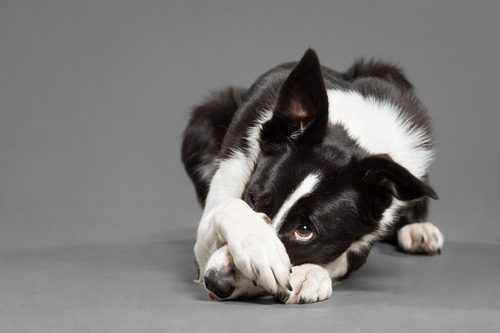Can I Give My Dog Benadryl for Fireworks?
Fireworks can be a source of immense stress and anxiety for many dogs. As a pet owner, you might wonder if giving your dog Benadryl for fireworks is a safe and effective way to help them cope. We understand you might just want to help relieve your dog of their firework anxiety, but before you give your dog human medication you should consult with your primary veterinarian. Although this blog should not replace professional veterinary advice, by the end of this article, you’ll have a clearer understanding of how to support your pet during these noisy celebrations.

How Is Benadryl Used for Dogs?
Benadryl, also known as diphenhydramine, is an over-the-counter antihistamine commonly used to alleviate allergy symptoms in humans. It’s sometimes used in veterinary medicine to address various conditions in dogs, including allergic reactions, motion sickness, and anxiety.
How Does Benadryl Work in Dogs?
Benadryl works by inhibiting the histamine receptors in the body, thereby reducing the effects of histamines. When administered to dogs, it can help reduce symptoms such as itching, swelling, and even mild anxiety. Benadryl is not a sedative and should not be relied upon solely for its calming effects.
Potential Benefits of Benadryl for Dogs
- Allergy Relief: Benadryl can help alleviate symptoms of allergies in dogs, such as itching, sneezing, and swelling.
- Motion Sickness: Some dogs experience motion sickness during car rides, and Benadryl can help reduce nausea and vomiting.
- Mild Anxiety: While not its primary use, Benadryl can have a mild calming effect, which might be beneficial during stressful events like fireworks.
Safety Considerations for Giving Benadryl to Dogs
While Benadryl can be beneficial for dogs in certain situations, consider several factors before administering it to your pet.
Proper Dosage
The appropriate dosage of Benadryl for dogs depends on their weight. The general guideline is 1 mg of Benadryl per pound of body weight, given two to three times a day. However, consult your veterinarian before administering any medication to ensure the correct dosage for your dog’s specific needs.
Potential Side Effects
Benadryl can cause side effects in dogs, including:
- Drowsiness: The most common side effect is drowsiness, which can help calm an anxious dog but may also make them lethargic.
- Dry Mouth: Some dogs may experience dry mouth after taking Benadryl.
- Urinary Retention: In rare cases, Benadryl can cause difficulty urinating.
- Digestive Issues: Some dogs may experience vomiting or diarrhea.
When Not to Use Benadryl
Benadryl should not be given to dogs with certain medical conditions, such as glaucoma, high blood pressure, or heart disease. Additionally, it should not be used in pregnant or nursing dogs without veterinary approval.
Preparing Your Dog for Fireworks
If you’re considering giving your dog Benadryl for fireworks, there are additional steps you can take to help them cope with the stress.
Creating a Safe Space
This could be a room with closed windows and curtains to muffle the sound and block the flashes of light.
Providing Comfort
Offering comfort items, such as your dog’s favorite blanket or toy, can provide a sense of security. Additionally, playing soothing music or using white noise machines can help drown out the noise of fireworks.
Gradual Desensitization
Gradual desensitization involves playing recordings of fireworks at a low volume and gradually increasing the volume while rewarding your dog for staying calm.
Alternatives to Benadryl for Fireworks Anxiety
While Benadryl can be an option, there are other methods and products available to help manage your dog’s anxiety during fireworks.
- Prescription Medications: For dogs with severe anxiety, your veterinarian may prescribe medications specifically designed to manage anxiety. These medications can be more effective and have fewer side effects compared to over-the-counter options like Benadryl.
- Natural Supplements: Natural supplements, such as melatonin or calming chews, can help reduce anxiety in some dogs. These supplements often contain ingredients like chamomile, valerian root, and L-theanine, which have calming properties.
- Behavioral Training: Working with a professional dog trainer or behaviorist can help address your dog’s anxiety through behavior modification techniques. This approach can be particularly beneficial for long-term management of anxiety.
Although Benadryl can provide some relief for your dog’s anxiety, you should consult with your veterinarian to determine the best course of action for your pet. Remember, every dog is unique, and what works for one may not work for another. If your pet is experiencing an emergency, call Parkway Veterinary Emergency Clinic in Lakeland, FL, at (863) 665-3199.
Recent Posts
About Us
At Parkway Veterinary Emergency Clinic, our team consists of experienced veterinarians and veterinary professionals dedicated to providing exceptional after-hours emergency vet care to the pet community of Lakeland.
